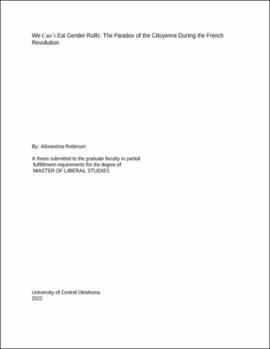| dc.contributor.advisor | Musgrove, Margaret Worsham, 1962- | |
| dc.contributor.author | Robinson, Alixandrea | |
| dc.date.accessioned | 2022-08-24T19:36:42Z | |
| dc.date.available | 2022-08-24T19:36:42Z | |
| dc.date.issued | 2022 | |
| dc.identifier.other | (AlmaMMSId)9982882410402196 | |
| dc.identifier.uri | https://hdl.handle.net/11244/336509 | |
| dc.description.abstract | The citoyennes of the French Revolution were silenced by the Republic of France through codification of Rousseau's Natural sexes, and their contributions to the French Revolution remain largely unexplored by historians. Examination of arrest and execution records found at the National Archives in Paris revealed that women were arrested in conjunction with their husbands’ crimes and were excused on the basis of the fairness of their sex. Chapter 1 affirms Olwen Hufton’s conclusion that women were motivated to public unrest by men’s failures and adds that women were emboldened to act in a man’s place, becoming active agents of change. Women navigated the political system and used crowds as a vehicle to enter the public, male sphere of influence, and in private, took charge of family planning methods. Chapter 2 identifies the paradox of the citoyenne and its resolution in disproportionate legal protections for women, the femme defense. These protections meant fewer than 400 women were executed during the Revolution, compared to 17,000 men. Additionally, Chapter 2 recognizes the life and works of Madame Roland, whose failed femme defense shows that the limits of the femme defense lie in a woman’s political success. Chapter 3 outlines the contradictions implicit in execution of a citoyenne and discusses the femme des letters, Olympe de Gouges, who argued in 1791 that "women have the right to take their places on the scaffold, they must also have the right to take their seats in government." This chapter concludes that the National Assembly executed women when they posed a threat to the foundations of the Jacobin agenda; becoming a femme-homme was a crime that demanded the peine de mort. This study ultimately argues that there existed, among the revolutionary debates, an assault on what it meant to be male or female. | en_US |
| dc.rights | All rights reserved by the author, who has granted UCO Chambers Library the non-exclusive right to share this material in its online repositories. Contact UCO Chambers Library's Digital Initiatives Working Group at diwg@uco.edu for the permission policy on the use, reproduction or distribution of this material. | |
| dc.subject.lcsh | Sex role | |
| dc.subject.lcsh | Political aspects | |
| dc.subject.lcsh | France | |
| dc.subject.lcsh | 18th century | |
| dc.subject.lcsh | Women | |
| dc.subject.lcsh | Legal status, laws, etc. | |
| dc.subject.lcsh | History | |
| dc.subject.lcsh | Revolution, 1789-1799 | |
| dc.title | We can't eat gender rolls: the pradox of the citoyenne during the French Revolution | en_US |
| dc.type | Academic theses | |
| dc.contributor.committeeMember | Webster, Catherine | |
| dc.contributor.committeeMember | Holt, Anne | |
| dc.thesis.degree | M.A., Liberal Studies | |
| dc.subject.keywords | Citoyenne | |
| dc.subject.keywords | Femme | |
| dc.subject.keywords | French Revolution | |
| dc.subject.keywords | Gender | |
| dc.subject.keywords | Rousseau | |
| dc.subject.keywords | Women's history | |
| dc.subject.keywords | European history | |
| dc.subject.keywords | Gender studies | |
| dc.subject.keywords | French literature | |
| dc.identifier.oclc | (OCoLC)1346859159 | |
| thesis.degree.grantor | Jackson College of Graduate Studies | |
